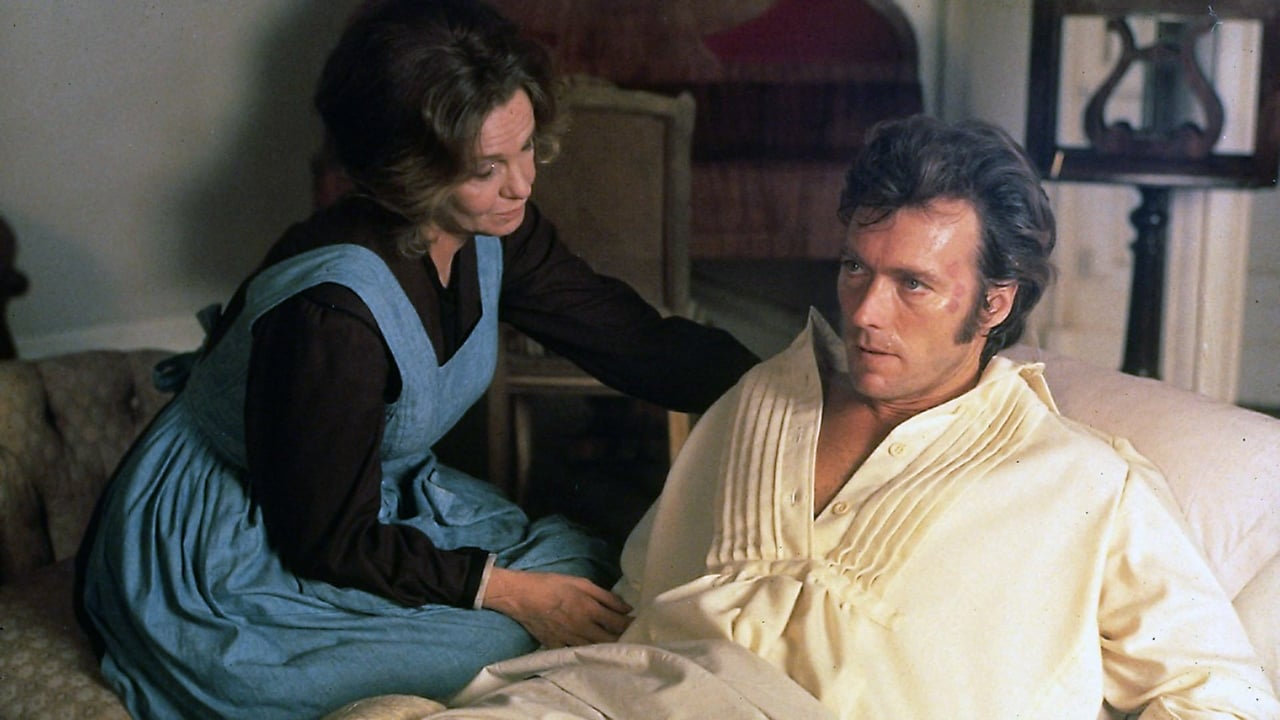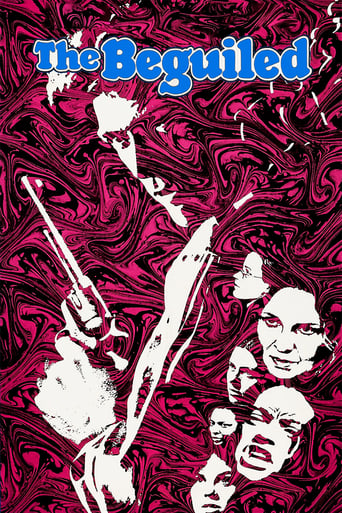



a film so unique, intoxicating and bizarre that it not only demands another viewing, but is also forgivable as a satirical comedy where the jokes eventually take the back seat.
View MoreThe movie runs out of plot and jokes well before the end of a two-hour running time, long for a light comedy.
View MoreThe movie turns out to be a little better than the average. Starting from a romantic formula often seen in the cinema, it ends in the most predictable (and somewhat bland) way.
View MoreThis film is so real. It treats its characters with so much care and sensitivity.
View MoreA double-bill of THE BEGUILED, Thomas Cullinan's source novel is a civil-war drama positing a tantalizing scenario where a wounded union soldier fetches up in a southern all-girls' school, nurtured to recovery by the apparently good-willed women but also subjected to temptations from female gazes and one false move, he will go through purgatory of his sorry life. The 1971 version is directed by Don Siegel, the third of his five collaborations with Clint Eastwood, who plays the Yankee Corporal John McBurney, and is discovered by a 12-year-old Amy (Ferdin, an absorbing talent), to whom he indulges with a peck on her lips, a blatant way to take away a child's first kiss (also pretty provocative by today's regressive yardstick), instantly, what Siegel hammers home to viewers is that he is not a humdinger, and through glimpses of fleeting flashback interleaved into the narrative, John emerges as a congenital liar, flippant and manipulative, currying favor from his petticoat accompany to slough from a possible fall of incarceration, whether it is Miss Marsha (Page), the headmistress of the seminary school, Edwina (Hartman), the virginal teacher to whom he claims his attraction, a nubile 17-year-old student Carol (Ann Harris), who is sexually active, even the slave Hallie (Mercer, a defiant soul hampered by her identity), cannot evade his come-ons. The advent of a hot-blooded albeit bedridden male inevitably causes an erotic disruption among the exclusive distaff clique, whose members are circumspectly secluded from the battlefield merely outside their perimeter and sexually repressed, for pert, callow girls, they are inclined to project John as a perfect specimen of their untested sexual allure versus the opposite sex, in the cases of Edwina and Carol, one is the prudish committed type and the other is a wanton nymphet. But the most complex character amongst them is no doubt Miss Marsha, whose incest past and subliminal lesbian proclivity get a full treatment in the audacious script and visual presentation, the latter is even coalesced with a flagrant religious connotation to soup up the film's maverick idiom. When the crunches arrives, a man's conceit in his potency is punished by blunt castration and signifies a rude wakening of the priapic worship. On top of his virile stallion credence, Clint Eastwood imbues a cunning, almost overweening facade which audience isn't familiar with, not cut from the same cloth from his hard-boiled tough-guy legend. Geraldine Page, emboldened by her matriarchal gravitas and demanding onus, doesn't shy away from any extraneous intrusion (the Union and the Confederacy alike) and builds a palpably beguiling tension through the mind games she plays with Eastwood yet holds the rein from stem to stern in unyielding resolution of taking the escalating situation in her own hands. Elizabeth Hartman, the fragile Oscar-nominated actress whose premature demise was a harrowing tragedy ripe for cinematic transposition, brings about something equally tangible and visceral as she is bedeviled by the discord between a man's promise and his action, but still holds out the last remaining benevolence out of her own impressionable nature. Crowned BEST DIRECTOR in Cannes, Sofia Coppola's remake is an aesthetically beguiling psychological intrigue, superbly recreates a mystical Gothic quaintness in the closing days of the civil war entrapped within the terrain of a majestic mansion of antebellum south, which certainly is a scintillating upgrade from the 1971 version's sepia retro flair. But story-wise, Sofia's script not only eviscerates the role of Hallie (which is a double-edged sword since she claims that out of the respect of this sensitive issue, she doesn't want to tread lightly, but also can be easily accused of racially insensitive), but also leaves no allusion of all the taboo issues tackled in Siegel's movie, lesbian kiss, incest depravity and of course, that inappropriate kiss between a grown-up man and a teenage girl, are outright sanitized, and in fact, the whole story has been strenuously internalized, for instance, John's transgression, where is given a plausible justification in Siegel's film, is carried out in a slipshod manner, indicating that it is nothing less than a spur of horniness. Atmospherical over dramatic, it is beyond reproach that Coppola opts to tell the allegory with her own agent, but unfortunately, the resultant impact doesn't meet up with expectation, especially when juxtaposed with its far more entrancing antecedent. Nicole Kidman intrepidly takes the mantle from Ms. Page, and actualizes an extremely sensual sponge-washing scene with Colin Farrell's less forthcoming and more sympathetic portrayal of a soldier turns paraplegic when he is subjected to an ambiguous retribution out of the necessity of saving his life. Kirsten Dunst and Elle Fanning don't make a splash in the shoes of Hartman and Ann Harris respectively, save Oona Laurence, whose Amy, precisely captures a child's malleable mentality.So, the jury is out, the remake is humbled by the original, which is quite a shocker because on the paper, Coppola's feminine sensitivity seems to be more adept to parse this age-old gender ax battle than an action-inclined Mr. Siegel, again there is no sure thing in the film industry, and that is exactly why it keeps us intrigued every time.
View More"The Beguiled" follows John McBurney, a fallen Union soldier in the American Civil War who is reluctantly taken in at a rural girls' school in Mississippi. The headmistress, Martha, agrees to keep him there until his health has been restored. John begins to woo each of the women in the house, but his flirtations and manipulations land him in dangerous territory as the household begins to come apart at the seams.Directed by frequent Eastwood collaborator Don Siegel ("Dirty Harry"), this little-seen but much- loved thriller is a potent blend of Southern Gothic and psychosexual drama. All of its strengths aside (and there are many), "The Beguiled" is one of those rare films that plays a variety of different ways without ever really committing itself to one. It could be read as a meditation on the war, a feminist parable, an outright horror film, or even all three (and more) at once. It never quite leans one way or the other; it's just as much a feminist film as it is anti-feminist; just as much horror as it is drama. The screenplay, based on Thomas Cullinan's novel, is left open-ended. What we have before us is ultimately a character study on sexuality and human desire, and the way it's read it depends on individual perspective.The film begins with a haunting credit montage that plays over disturbing historical photos of the war. Sounds of horses, gunfire, and screaming narrate the credit sequence, which sets a tone of unease and instability from the first frame. The film is saturated with an oppressive Gothic atmosphere that underpins an array of situations between Eastwood and the women in the house— even the lighter (sometimes even darkly humorous) moments hint toward an impending reckless abandon. Moody cinematography accentuates the unease, and several haunting POV shots from Eastwood as he is carried by the women into the house (and later, into the dining room in one of the film's most famous and most violent scene) are unforgettable.Eastwood, who made a career for himself as a hyper-masculine sex bomb in his early years, plays against character—here, he is physically helpless, resorting to emotional manipulation that eventually backfires. His performance is memorable, though his character, despite being the film's center, seems to be given far less screen time in comparison to the rest of the female cast. Geraldine Page gives one of the best performances of her career as the sexually repressed headmistress who has a questionable romantic history. Page is terrifying and at times sympathetic, but, like the film as a whole, can never quite be pinned down, and that's part of her brilliance. Elizabeth Hartman is fantastic as well as the meek schoolteacher who wins Eastwood's affections, and Jo Ann Harris plays a Civil War Lolita who is as devious as she is charming. Pamelyn Ferdin is also striking in her performance as the youngest of the girls, and the catalyst for what brings Eastwood into the house, and eventually, out of itOverall, "The Beguiled" is something of an unsung classic. The strength of its performances alone is enough to warrant multiple viewings, but the ambiguity of its moral stance (if there even is one), and its candid yet dithering narrative make it an even more compelling watch. It's tense, hauntingly beautiful, and also downright unnerving in unexpected ways. Regardless of how it's read, the presentation is flawless. 10/10.
View MoreYoung Amy finds injured union soldier Corporal John McBurney (Clint Eastwood). She takes him back to her boarding school run by Martha Farnsworth (Geraldine Page). The girls are fearful of the approaching war and the possible arrival of union soldiers. Martha decides to not turn him over to the Confederate patrols. Every female is stirred up by the arrival of McBurney. He's a charmer and a liar. Martha is both lustful and jealous. Carol (Jo Ann Harris) is a sexual 17 year old student. Edwina (Elizabeth Hartman) is the sweet innocent romantic teacher. Amy is completely infatuated with McBurney and keeps a pet turtle.This movie has a natural Gothic romantic horror vibe. I really like the constant disturbed tone. It's a slightly different character that Eastwood is playing. The movie is playing to fear of a group of women destroying a man. I would prefer the school be much more isolated. More isolation would build up a greater sense of dread. The other possibility is to make capture a much more vicious affair. That way the dread is build up both outside the school as it slowly builds inside. Either way, the influences from the outside keep muddying up the creepy relationships in the house.
View MoreAmong the many things that THE BEGUILED lays bare is the repressed hypocrisy of the antebellum South. While the men are away, the women make do with whoever's at hand- in this case, wounded Union soldier Clint Eastwood. Like MANDINGO and DRUM, THE BEGUILED delves into seldom-charted territory: Southern sexuality. Eastwood is great as a man more than willing to manipulate the eager Southern belles who practically throw themselves at him and director Don Siegel (one of my all-time favorite directors) has a firm grasp on the proceedings (...). Envy and ennui combine for an explosive climax (...) that's every bit as satisfying as the carefully constructed set-up. The Gothic elements are icing on the proverbial cake.
View More